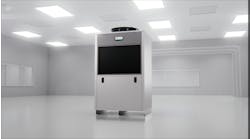Latest from Hydronics
Sponsored
NEW ALBANY, OH – Best Plumbing has been in business for the past 25 years serving the central Ohio region. Jay McConahay has worked at Best for the past 20 of them and is currently a supervisor with the company. Best Plumbing employs (depending on the season) about 22 people in the field with three full-time workers back at the office.
“We are maybe 85 percent new construction, 10-15 percent service,” McConahay says. “We do everything from middle-of-the-road all the way up to $4-$5-$6 million houses… we do a little bit of light commercial. We don’t do a whole lot on the heavy commercial side, but we’ll do some shopping strips here and there, some small start-up businesses.”
About nine months ago, McConahay had an offer from his local Rheem rep to try out the company’s new hybrid water heater, the ProTerra. The ProTerra can function as a standard electric heater or as a heat pump water heater, depending on the homeowner’s choice, demand and prevailing conditions.
Rheem was trying to gather data on both how the plumbers would install the new unit, how homeowners would use it, and how the heater itself would perform in various climates. Given the new housing boom underway in central Ohio, offering McConahay a “test drive” seemed the perfect choice. McConahay swapped out is old 50-gallon electric heater for the hybrid.
“I live out in the country so propane is pretty expensive. Natural gas is not available,” McConahay explains. “So I went with this electric, 80 gallon hybrid. I put it on ‘hybrid only’ mode, which is a slower recovery, but because I have the 80-gallon capacity, there’s no chance of me really running out.” Other modes include vacation, energy-saver (a combination of electric and heat pump), and high demand.
The McConahay household has five members (two adults, two kids and a baby), and they take plenty of showers, both concurrently and consecutively. Even while operating in hybrid only, at no point did the family run out of hot water. And the energy savings proved an even bigger surprise. “My electric bill went from $222 to $89. That’s not even [the first] full month, just the first three weeks of using it,” McConahay says.
And if the direct benefits weren’t enough, there were at least a couple side-benefits of the heat pump technology that impressed McConahay.
The first was automatic dehumidification. The ProTerra pulls moisture out of the air as part of the heat pump cycle. “I used to have two dehumidifiers in my basement that ran 24/7,” McConahay says. “I was able to unplug those and put them in storage because I don’t need them anymore. Keeps the air perfectly dry down there.”
The other was free air conditioning, although it takes a few steps to set up. “It does have a fan on the side that blows out cold air, it’s a byproduct of the heating process. Turns out Rheem has a kit that hooks to your ductwork, where I can actually pipe that to a single heat run in my house,” McConahay says. “It will deliver enough cubic feet to supply one heat run. But in the wintertime I need to put a damper on it so I can divert that air to the outside, because it will make the basement awful cold.”
Steve Bissinger, Plumber Support Manager for Rheem, has been trying to get the word out ahead of the ProTerra’s launch--that proper installation is the key to attaining the highest efficiencies.
“It’s absorbing latent heat and sensible heat in the air where it’s installed,” Bissinger says. “There are applications where it can be tougher to put a hybrid into, say, a tight closet. What Rheem has done, they’ve provided ducting outlets on the unit to either bring in intake air from other areas, or to exhaust the heater to other places. It’s done exceptionally well in places like, for instance, in my home I have one-pipe steam (it’s a really old home), there’s a lot of moisture down there, so there’s always a ton of latent heat available for that. Also, if they have a refrigerator or freezer down there in the basement right next to it, that’s something that we’ve been working with contractors to help them take advantage of that heat source.”
As part of educating contactors—not just on installation, but on service, troubleshooting and even rebates available though state governments and local utilities—Rheem has taken to the Internet offering a host of options for installers hoping to add the ProTerra to their offerings.
“We do offer online training or anytime e-learning at Rheemtraining.com where contractors can go access our video library if they need more information. We’re actively now doing a lot of webinars and hopefully leverage plumbers’ downtime during COVID-19,” Bissinger says. “We’ll do webinars direct, one-on-one with a company… I’ve done a webinar where it was just for one contractor and a couple of his guys, and it’s great because they can ask questions and we can talk back and forth.”
After his experience, McConahay is adding the ProTerra to his lineup. “Yes, we are definitely [offering it to our customers]. I’ve been in talks with several of our high-end builders… The energy savings of this unit is something that can’t be denied. It’s more efficient than any tankless water heater on the market by four times the energy-cost savings.”


